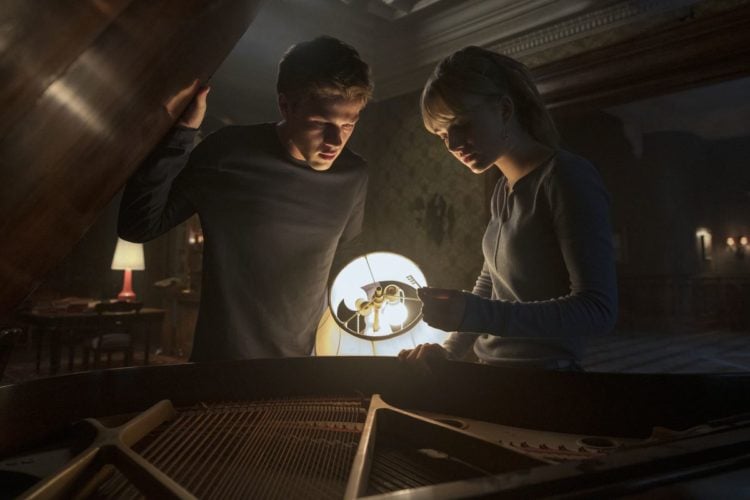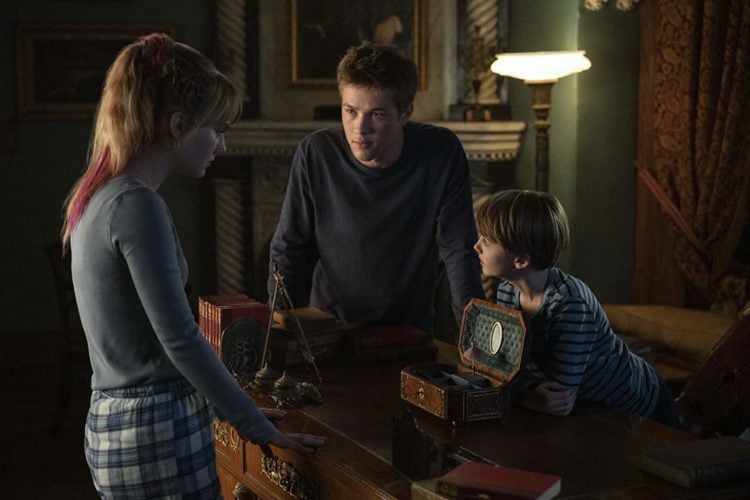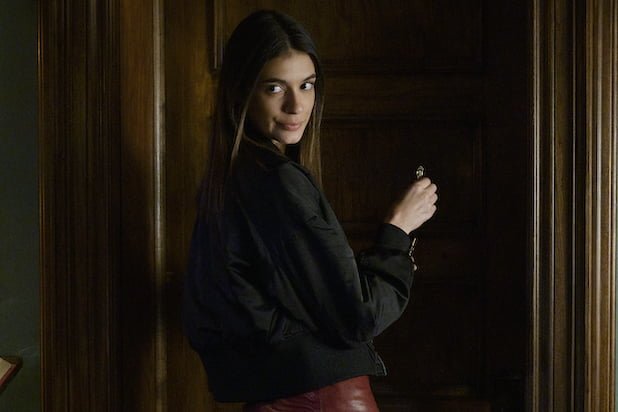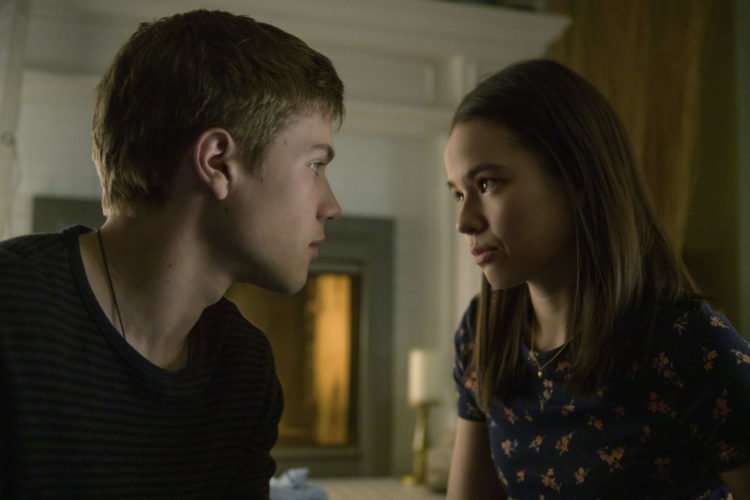
For its first act, Locke & Key’s did an admirable job laying the groundwork for the series’ sibling protagonists, giving all three a chance to shine. The middle half (or second act) of the season refocuses the narrative more on Kinsey and Tyler. Bode is still an integral part to the story but his screen time clearly truncated as a sacrifice to better develop the Kinsey and Tyler’s similar but very different paths of emotional upheaval.
“I took out my fear.”
Ever wonder what removing one’s fear as if it were a zit would be like? Well, “The Keeper of the Keys” gives us that, showing a very different Kinsey after she buried her fear in the backyard of her own mind. Whereas she had the typical uncertainty and doubts of a teenager, now she’s confident and direct, almost to the point of being disconnected from the emotions of others. Emilia Jones is phenomenal with Kinsey’s transformation; the energy she exudes is that of a completely different person and though she still exhibits her other emotions though she also, for the most part, displays a greater command of her emotional state. Yet, as one would guess, being absent a fear response is not the healthiest thing in the world.

Without that voice questioning the dangers of her actions, she puts herself (and others) into needless danger, as shown in “The Black Door”. The laser focus she displays on her objective (in this case the Omega Door… which will no doubt play a major role in the back half of the season) is a positive thing but when it’s not accompanied by a voice of caution, well, see her and the Savini Squad’s near drowning in the sea caves as exhibit A, B, and C of the possible consequences. And though she acknowledges her mistake with Gabe (Griffin Gluck, American Vandal, Tall Girl) after Scot all but wipes his hands of her, even breaking down in tears (though more likely frustration than anything else), there are no real signs of her empathy.
This change in her is best highlighted in “Family Tree” after she and Tyler (who can both now hear the “call” of the keys) come across the Music Box key. Allowing the person who opens the Music Box command over any person they name, Kinsey and a somewhat reticent Scot use it on Eden (Hallea Jones, Charity, Let It Snow), the ‘I’m better than you’ high school queen that ridicules Scot and the Savini Squad’s work on his movie. Their initial attack on her, while uncomfortable, is that typical ‘get revenge on the narcissistic bully’ trope present in many a high school dramedy. But with a bit of encouragement from Gabe, she takes it well past the point of getting even, and after forcing Eden to humiliatingly douse herself with condiments, she and Gabe cruelly up the ante and command the terrified and confused Eden to make out with a statue for the entire cafeteria to see. It goes far beyond what Eden — who has been an afterthought for most of the series — did to Scot but, considering these are immature teenagers, the behavior is not wholly out of sorts. But it does emphasize Kinsey’s massive change, one that we should watch as Locke & Key moves on to its third act.
“New can be very good.”

As much as Tyler was a captivating force in the first three episodes, his character arc takes a nosedive in these three episodes. After seeming to regain his footing in life, thanks to some good advice from English teacher, Joe Ridgeway (Steven Williams, Ambitions, It, Supernatural), Tyler quits hockey and puts his efforts into volunteering (no doubt helped along by Jackie’s presence) and trying to keep his siblings in line as to the use of the keys. This responsibility as the man of the house intensifies when he (and Kinsey) gain the ability to hear the whispering voices of the keys.
Tyler begins to open up to others as well; first his sister and then Jackie, as the pair draw closer during their volunteer work. This positive momentum comes to an abrupt halt when they find the Cemetery key. Finding a cache of Duncan’s memories and one that appears to be of their father murdering one of his friends, it’s the catalyst for Tyler’s rapid backslide. Unlike Kinsey, who refuses to believe the truth of the memory without question (a good idea), it’s enough for Tyler to spiral back into his pit of misery and self-loathing. First, his relationship with Kinsey blows up (though she’s just as culpable in this) and then he sabotages what had been forming between him and Jackie. As if that’s not enough, Dodge makes her move, preying on Tyler’s emotional vulnerability and he falls for it, though we’ve yet to know just how deep of trouble he’s in.
My disappointment is not with Tyler emotional decline, rather its sloppy execution. His arc is rushed and disjointed (much like the narrative in this block of episodes, but more on that later) and missing the connective tissue for it to make sense. We’ve gone from him feeling that wracking guilt of failing his family to being okay with who he is and then back to… well, I’m not sure what he’s back to now since it’s not in line with what we’ve seen of Tyler so far. Connor Jessup is not the problem as he does what he can to make Tyler’s arc captivating, but he can’t make up for the shoddy writing enough to bring his character up to the levels of Emilia Jones’ Kinsey.

Though Tyler’s current trajectory is a tarnished mark in the narrative (from where he was headed, at least), even its disappointment is better than Nina’s uninteresting storyline. Though relegated to the periphery early on, it seems as if her story is being remapped to become a major part of the narrative. This is through no fault of Darby Stanchfield either; like Connor Jessup, her performance exceeds her story and her character’s lack of pull, whether it be from her current struggles or questions about her past, necessary to make up for her narrative irrelevance. It’s difficult to judge if Nina’s development will be a waste of time (we’ll have to see how the rest of the story plays out) but the time spent on her story would have been best focused on developing more cohesion in Tyler’s transformation or even a bit more backstory on Dodge (though we may get that down the road). Even without some of my prior knowledge of the source material, the focus on the adult side of things is an unnecessary addition and takes away from what really matters: Bode, Kinsey, and Tyler’s journey into this fantastical world of keys and the magic they bring.
As impressed as I was with Locke & Key’s first act, the second act left something to be desired. There were too many instances of a narrative lacking a tight and distinctive flow as if large chunks of the narrative were cut away and then pieced back together. Even in its adequacy, Locke & Key seems to be making the same mistake a lot of adaptations do: trying to fit an overabundance of material into a small window that has no hopes of doing it justice. There’s plenty of time to make up for some of this pitfalls, particularly as the narrative picks up steam — especially considering Dodge’s nefarious plans, including pressing Sam into her service and having him crash back into the lives of the Locke family and Tyler clueless that he’s cozying up to a viper of the worst sort. Joe’s death and the mystery behind Ellie’s behavior is also on the table and, to reach its vast potential, Locke & Key needs to regain the solid momentum it lost.
